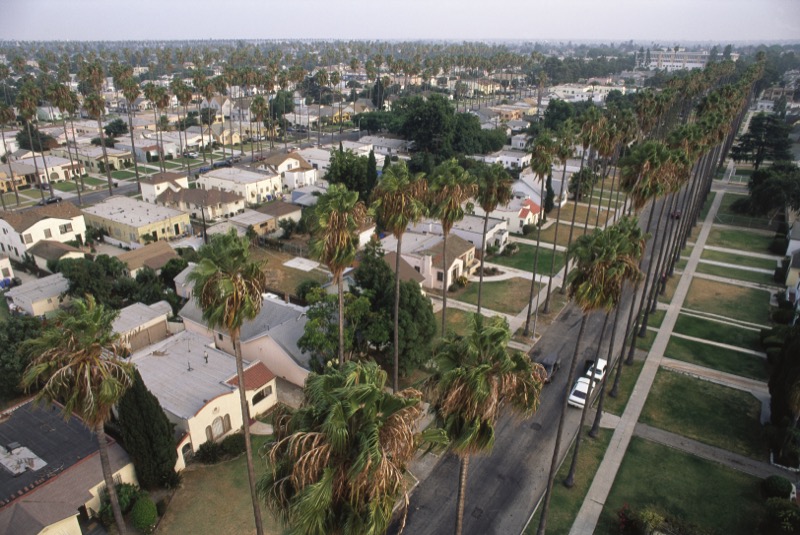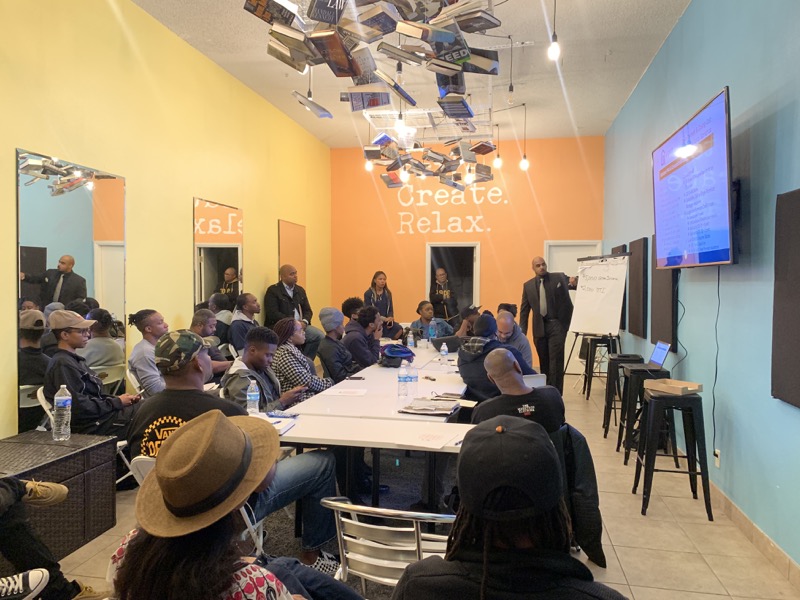Residents are meeting up each month to learn about buying property as a way to build generational wealth
By Jessica Flores | @jesssmflores

For Daniel Carter, the strip mall where Nipsey Hussle was killed in March, is one of the most important places in South LA.
The late rapper was a South LA champion who invested in his community, in part by purchasing that shopping center at Crenshaw Boulevard and Slauson Avenue.
Hussle’s death “left a huge scar in the community,” says Carter, 35, a music business manager and real estate investor. “I felt like at one point his spirit kind of burst into a million pieces and everybody got a little piece… I feel like our piece of it was this real estate thing.”
After Hussle died, Carter launched Buy Back The Block L.A., a monthly meet up to educate South LA residents on how to fight gentrification by buying property in their neighborhoods.
Arlen Escarpeta, an actor and Inglewood native, is in the process of being pre-qualified to buy a home in Inglewood. He’s getting help from a broker he met from the group.
“I don’t know if I would be so much in the know of how and what’s going on [in real estate],” says Escarpeta, 38. “It would probably feel a lot more daunting if I didn’t have the education and the things that I’ve learned from the group.”
About 30 people gather each month in The Metaphor Club, a black-owned co-working space along Crenshaw Boulevard, across from Leimert Park Village. At each meet-up, Carter goes over real estate terms and definitions, offers advice on how to raise your credit score, and imparts the importance of buying homes in the neighborhood.
”We’re anti-gentrification, and we’re unapologetic about it,” he says. “We don’t want to see people who grew up in these neighborhoods get pushed out. This is our neighborhood. This is our culture. These are our streets.”
At a meeting in December, guest speaker Carlden Lainfiesta, a loan officer, highlighted a couple of programs that help qualifying homebuyers with down payments and closing costs.
In a county where the typical home costs $620,000, and where the majority of households rent, not own, those programs can be invaluable—especially for people of color, who, for decades, were locked out of homeownership.
The national rate of black homeownership is the lowest of any minority group, says Ashley Thomas III, an executive with the National Association of Real Estate Brokers, which is working to increase the number of black Americans who buy homes.
Thomas says he has seen more grassroots groups like Buy Back the Block L.A. pop up throughout the country, usually led by religious groups and musicians and actors.
“More people are trying to influence their family, and then their community, so you’re gonna see a lot of groups [like Buy Back the Block L.A], which is great,” he says.
Last year marked the 50-year anniversary of the Fair Housing Act, and Thomas says it opened up a lot of people’s eyes, because “we’re still at the same ownership rate in the black community that we were 50 years ago.”
The homeownership rate in Los Angeles is one of the lowest in the nation, with more than 64 percent of households renting, according to a 2018 Zillow report.
Black homeownership, in particular, has significantly dropped over the years nationwide.
Recent census data shows the national black homeownership rate at 40.6 percent in the second quarter, hitting its lowest point on record.
Gary Painter, director of the USC Sol Price Center for Social Innovation, says black homeownership rates in South LA are particularly low because of old discriminatory lending practices and racist housing policies.
In the early 20th century, it was common for developers and homeowner associations to require white homeowners to sign deeds that contained covenants promising to never sell to African Americans.
The area around Central Avenue, a street cutting through South LA, was one of the few places in the city where black people were allowed to buy property. But the government-sponsored Home Owners’ Loan Corporation deemed non-white neighborhoods “risky,” and its redlining maps not only discouraged and prevented community investments but made it difficult, if not impossible, for people of color to obtain home loans.

South LA resident Danielle Jakes says she knew nothing about real estate before joining the group.
“I love that everything [Carter] has learned, he brings back to us,” Jakes, 35, says. “So when we go out and hear different terms, we’ll know what they’re talking about.”
Jakes is part of a smaller group from Buy Back The Block L.A. who pooled their money to buy properties in Indiana. It’ll be her first time buying property. Eventually, she says, she wants to own a home for herself in South LA, where she lives near the intersection of Slauson and Western Avenue, but she’s still learning the ropes.
Jakes knew Hussle from their high school days at Hamilton High School. She says Buy Back The Block L.A. is more than just a group; they’re continuing Hussle’s legacy.
”We’re coming together and helping each other out just as Ermias [Hussle] did,” she says.
Carter says he chose Indiana because he already owns property in the state. He bought his first home in Palmdale, where he spent most of his childhood, and currently rents in Jefferson Park.
He says he hasn’t bought a home in South LA yet, because of how expensive it is.
“Going out of state where you can buy five houses for the price of one in LA gives you a chance to get in the game and start stacking your paper,” says Carter.
Carter owns 11 rental units in Indiana that he says he rents to tenants with Section 8 vouchers.
“I buy my houses in the hood, because I don’t mind owning in the hood,” he says. “I’m not necessarily flipping them, I’m buying them, and I’m holding them.”
“The negative side of flipping is when somebody comes in to our neighborhoods, you know, like what’s happening here in Echo Park, where these people who don’t grow up around here coming in flipping houses and raising the prices,” Carter says.
Jerome Wiley, a sixth grade educator, owns property in Los Angeles and Tennessee. He heard about Carter’s group through a friend and says that the idea of “investing with like-minded people who look like me drew my attention.”
“I’m glad to see that there’s a broad age group—some younger people and people like myself,” says Wiley, 56. “We’re working together to achieve a goal to increase family wealth.”
Escarpeta agrees. He wants to give back to his community and family by teaching them that real estate can be one way to build and sustain wealth, without having to leave their neighborhood.
“What I don’t want to do is get to a point where I can’t afford to live in a place that I call home,” he says.
CREDITS: \ Curbed LA